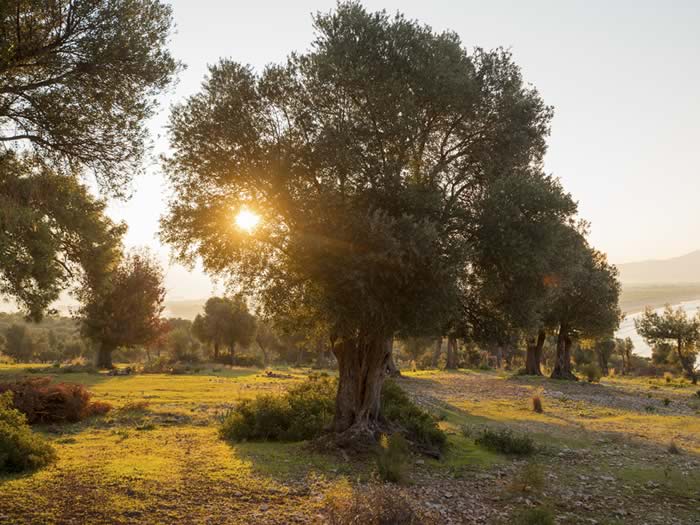 Readings :Amos 8:1-12Psalm No. 52Luke 10:38-42
Readings :Amos 8:1-12Psalm No. 52Luke 10:38-42
It’s a valuable discipline to follow the lectionary Sunday by Sunday, although there are times when one questions the logic behind the choice of readings.
Like today! To hear the harsh judgements of Amos, the rough shepherd from Tekoa who comes down from the hills to sort out soft urbanites in the valleys; and then turn to the rumblings of a psalm too robust to get a place in our hymn book with its sharp division between the faithful and the faithless and with very bad news for the faithless; and then to compare them with the briefly fraught domestic life of two sisters hosting an important guest, is an interpretative challenge. But there are connections, so let’s try to honour these biblical snippets that are presented to us this morning, without doing injury either to them or to our intelligence.
For each of them is about contrasts and choices.
The two O.
T. readings are fashioned out of very different experiences from those of the N.T. and both of them have a very hard theology which we may shy away from. There are some severe hang ups for us here – belief in a vengeful God and a God that has favourites : writing the story of God as if he is just like us. God like when we are at our worst, rather than catching glimpses of him in the best of us. Sadly it’s in much of our theology and I wish we could get shot of it.
I can’t believe in a God of inclusive love and at the same time believe that he angrily discriminates against people who for myriad reasons have not responded to it. A theology of those in and those out has bedevilled an open and loving faith since the disciples went public. The division between evangelicals and liberals in the church today – a division we may regret but need to recognise – finds its point of greatest conflict over this issue.
Is there room for everyone in the affections of God or only for those who conform? It’s not a new question, it was one faced by Luther and Calvin, and they came to different conclusions. Deep questions here that have a long cultural theological history and we have to face them.
The Psalmist deals with ethical contrasts, in the rather priggish way that can be typical of the genre. The 19th.century mystic R.M.Benson, christianising the psalms (not an easy job) calls them ‘The War Songs of the Prince of Peace’, trying to reconcile the harshness of many of them with the promise that dwells in them as well. Here at first there’s a judgement from God against those who plot destruction and have tongues like a sharp razor (hence the phrase ‘a cutting remark’).And another powerful simile – ‘you love words that devour’. How many people have we gobbled up with our thoughtless words? And it’s so difficult when that happens, to get back to where you were in a relationship. It has to be a very forgiving person who accepts your apology that you didn’t really mean what you said. And then some of that hard theology about what God is going to do. Terrible words follow – break, snatch, tear, uproot and then the really nasty bit – the good people will laugh at the wicked people. So ‘the war’ rages but then at last something rather beautiful – ‘I am like a green olive tree in the house of God…I will proclaim your name, for it is good.’
And then Amos. ‘How mean can you get?’ he says. This constant oscillation between the rituals of faith (and they should be observed insists the prophet) and the way the faithful actually live which should be about caring for people, especially underprivileged people. Terrible disasters for those who may be good at religion but are bad at relationships, so that feasts are turned into mourning, songs into lamentations; and sackcloth on your loins and baldness on your head. And then the terrible, terrible analogy that if this is how we behave, there will be howling misery, like the death of an only son. O.K. Rationalise, contextualise, give historical perspective to the prophets, but hear the truth that is here as well. ‘Religion that matters more than my neighbour’s needs’?. A poor religion in 5th century Judea, and a poor one now.
And now Mary and Martha. A quite different glimpse into contrasts and choices. The psalmist and the prophet are specific about ethical errors. St Luke however tells us about a situation from which we are invited to draw our own conclusions. It’s an intense and poignant moment when two sisters meet Jesus, give him hospitality and respond to their guest in different ways. It is so real this story that it starts you wondering about its context. Was this an established relationship, one of several moments when Jesus (no disciples around) was able to be relaxed with two women he had a close and easy relationship with, as with their brother, Lazarus. The gospels concentrate on the twelve companions who spent so much time with their travelling preacher, but there are many hints of other friendships, and this is one of them.
If this then is a meeting of friends it’s a visit that goes a bit wrong. Most of us who have spent too much time in the kitchen have at least been tempted to say to the rest of the family, ‘quit the socialising and come and give me a hand’. Toss of the head, ‘any excuse to get out of the chores; typical you’ (said later perhaps at the end of the day). Martha the moaner? I think not. Those of us who believe in straight talking may in fact side with this encumbered servant rather than with Mary, the dreamy groupie. Martha is in Amos’s words, ‘looking after her neighbour’s needs’ and Mary seems to be doing what he warns against, ‘religion taking precedence’. In fact this incident in Luke follows the parable of the Good Samaritan. That’s Martha for it’s she who invites Jesus in for a meal. And yet. Some months after this visit, Jesus is dead, and we can imagine the grief of the one and the regret of the other – Martha saying to her sister, if only I had spent more time listening as you did, remembering him would be less painful. ‘We have both lost him, but me – I never properly gave time to him’.
Perhaps. Lots of ways we can interpret the story and one of them is to take seriously the contrasts again. Each of today’s readings illustrates the difference between unthinking habit which can shrink the human spirit and openness to human need and to God which will nourish it. Here it’s not a moral contrast but a personality one between two very different people who happen to be sisters, both of them good, but one of whom may have an over-structured life. It’s a contrast between routine and change; a contrast between recognising priorities, identifying the moment of truth, about what matters most, but also being unaware of it…
One of the good things about being an ancient relic like me is that you recognise the way your life has been formed through the years and you have some opportunity when you are less hidebound, to try and break the mould a bit. Martha couldn’t do it. It was her role to be in the kitchen doing the work. More of it than she wanted, and perhaps regretting her spontaneous invitation, she tries to get her guest on her side –‘tell her, Jesus’ she cries, her face red with the cooking, preparing more perhaps than for three in case all those friends of his suddenly pile in and want to be fed as well.
And as the story is told, Jesus doesn’t respond. The man whom we know enjoyed a good meal has met someone who rests in his presence, who listens, reflects, is growing spiritually under his influence and is refreshing his spirit as well perhaps. For a moment food doesn’t matter. It is a moment when the mould has to be broken, and Martha isn’t up to it. We know more about Martha than we do about her sister, but its Mary who’s got it right and its dear sweaty Martha who didn’t quite get there.
The word ‘soul is not in fashion. I once knew of a minister who used to say –hopefully only to a selected group of people (it could be a way of losing friends) – ‘how is your soul today’? I have often wondered what my answer would have been had he asked me. And yours? Is there room in our life for habit to be challenged and for our souls to be fed? To recognise revelation when it’s there, and with all your being, respond to it. We can’t live without routine. It’s the way we pace our lives and build our economic and personal relationships. People need to know where we are and who we are. It’s attractive to have a few odd balls around if only to measure our own stability by. But only a few.
The world is run by Marthas, too many of whom as Amos says, ‘buy the poor for silver and the needy for a pair of sandals’. Male Marthas most of them, busy, bossy, capable people and yet people who though often necessary, may not be loved, and perhaps have learned little except how to make the world go round.
But the world is made bearable and beautiful, emotionally deep and hopeful, by people like Mary, who quiet and receptive and as the Psalmist says take refuge in God. The great contemplative figures in Christian history have been able to rest in the Lord because others have dealt with the practical side of their lives and given them the freedom that they have needed.
Mary it seems had the sense to seize the moment and make it holy, as often we have opportunity to do, an opportunity which amongst all our busyness, we would be wise not to neglect. The psalmist says he is like a green olive tree in the house of God. It is a beautiful image, a tree, stumpy, gnarled and ugly but whose fruit in the Mediterranean world produces food and light, sustenance. And illumination, as Jesus did for Mary, and for us. So be it.
So many stories whose endings we can never know. So let’s make our own ending for these three. Amos dies before any sign of the punishments he prophesies, but he has said his piece and has made his contribution to a moral judgement measured by how the seriously rich treat the abject poor. The Psalmist learns that his deepest satisfaction is in God, not in sorting out the infidels. And then dear, faithful, hospitable, hard-working Martha? Mary could have given her a hand. And Jesus too. So perhaps in the end, both of them did, all of them ending up in the kitchen, as the mutual learning process which is the kingdom of God, held all three together in its gentle embrace.





